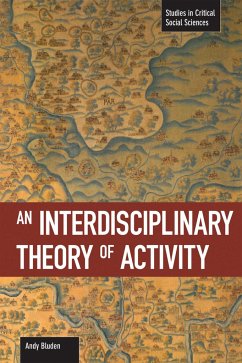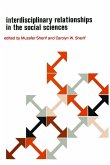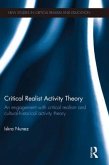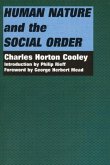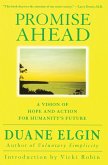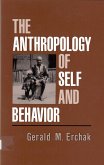Andy Blunden
An Interdisciplinary Theory of Activity
Andy Blunden
An Interdisciplinary Theory of Activity
- Broschiertes Buch
- Merkliste
- Auf die Merkliste
- Bewerten Bewerten
- Teilen
- Produkt teilen
- Produkterinnerung
- Produkterinnerung
An immanent critique of Cultural-Historical Activity Theory, the pschychology originating from Lev Vygotsky
Andere Kunden interessierten sich auch für
![Interdisciplinary Relationships in the Social Sciences Interdisciplinary Relationships in the Social Sciences]() Muzafer SherifInterdisciplinary Relationships in the Social Sciences80,99 €
Muzafer SherifInterdisciplinary Relationships in the Social Sciences80,99 €![Critical Realist Activity Theory Critical Realist Activity Theory]() Iskra NunezCritical Realist Activity Theory69,99 €
Iskra NunezCritical Realist Activity Theory69,99 €![Human Nature and the Social Order Human Nature and the Social Order]() Charles Horton CooleyHuman Nature and the Social Order71,99 €
Charles Horton CooleyHuman Nature and the Social Order71,99 €![The Presence of Self The Presence of Self]() R. S. PerinbanayagamThe Presence of Self73,99 €
R. S. PerinbanayagamThe Presence of Self73,99 €![Promise Ahead Promise Ahead]() Duane ElginPromise Ahead18,99 €
Duane ElginPromise Ahead18,99 €![Lesbians and White Privilege Lesbians and White Privilege]() Lesbians and White Privilege65,99 €
Lesbians and White Privilege65,99 €![The Anthropology of Self and Behavior The Anthropology of Self and Behavior]() Gerald M ErchakThe Anthropology of Self and Behavior48,99 €
Gerald M ErchakThe Anthropology of Self and Behavior48,99 €-
-
-
An immanent critique of Cultural-Historical Activity Theory, the pschychology originating from Lev Vygotsky
Hinweis: Dieser Artikel kann nur an eine deutsche Lieferadresse ausgeliefert werden.
Hinweis: Dieser Artikel kann nur an eine deutsche Lieferadresse ausgeliefert werden.
Produktdetails
- Produktdetails
- Verlag: Haymarket Books
- Seitenzahl: 346
- Erscheinungstermin: 20. März 2012
- Englisch
- Abmessung: 228mm x 153mm x 25mm
- Gewicht: 581g
- ISBN-13: 9781608461455
- ISBN-10: 1608461459
- Artikelnr.: 33323143
- Herstellerkennzeichnung
- Libri GmbH
- Europaallee 1
- 36244 Bad Hersfeld
- 06621 890
- Verlag: Haymarket Books
- Seitenzahl: 346
- Erscheinungstermin: 20. März 2012
- Englisch
- Abmessung: 228mm x 153mm x 25mm
- Gewicht: 581g
- ISBN-13: 9781608461455
- ISBN-10: 1608461459
- Artikelnr.: 33323143
- Herstellerkennzeichnung
- Libri GmbH
- Europaallee 1
- 36244 Bad Hersfeld
- 06621 890
Andy Blunden is an independent scholar in Melbourne, Australia. Andy works with the Independent Social Research Network and the Melbourne School of Continental Philosophy and has run a Hegel Summer School since 1998. Andy retired from Melbourne University in 2002.
Part I. Introduction and Historical Excursus
1. Introduction
2. Soviet Cultural Psychology (1924-)
3. Goethe's Romantic Science
4. The Young Hegel and what drove him
5. The Phenomenology and 'formations of consciousness'
6. The Subject Matter of the Logic
7. Being, Essence & the Notion
8. Subjectivity and culture
9. Hegel's Psychology and Spirit
10. Marx's Critique of Hegel
11. Marx and the Foundations of Activity Theory
12. Marx's Critique of Political Economy
13. Conclusions from this Historical Excursus
Part II. Lev Vygotsky
14. Vygotsky's Critique of Behaviorism
15. Vygotsky and Luria on Romantic Science
16. Vygotsky on Units and Microcosms
17. Vygotsky on Gestalt and Bildung
18. The Significance of Vygotsky's Legacy
Part III. Activity Theory
19. Activity
20. Activity as the Substance of a Science
21. Criticisms of Vygotsky's concept of Activity
22. Leontyev's Anatomy of Activity
23. Leontyev's Activity Theory and Marx's Political Economy
24. Groups as a Model of Sociality
25. Yrjö Engeström's Model
26. Michael Cole and Cross-Cultural Psychology
27. The Results of this Immanent Critique
Part IV. An Interdisciplinary Approach
28. Collaborative Projects
29. Ethics and Collaboration
30. Marx's Critique of Political Economy and Activity Theory
31. Towards a Taxonomy of Activity
32. Collaborative Projects and Identity
33. Collaborative Projects and Agency
34. Emancipatory science
35. Conclusion
References
Index
1. Introduction
2. Soviet Cultural Psychology (1924-)
3. Goethe's Romantic Science
4. The Young Hegel and what drove him
5. The Phenomenology and 'formations of consciousness'
6. The Subject Matter of the Logic
7. Being, Essence & the Notion
8. Subjectivity and culture
9. Hegel's Psychology and Spirit
10. Marx's Critique of Hegel
11. Marx and the Foundations of Activity Theory
12. Marx's Critique of Political Economy
13. Conclusions from this Historical Excursus
Part II. Lev Vygotsky
14. Vygotsky's Critique of Behaviorism
15. Vygotsky and Luria on Romantic Science
16. Vygotsky on Units and Microcosms
17. Vygotsky on Gestalt and Bildung
18. The Significance of Vygotsky's Legacy
Part III. Activity Theory
19. Activity
20. Activity as the Substance of a Science
21. Criticisms of Vygotsky's concept of Activity
22. Leontyev's Anatomy of Activity
23. Leontyev's Activity Theory and Marx's Political Economy
24. Groups as a Model of Sociality
25. Yrjö Engeström's Model
26. Michael Cole and Cross-Cultural Psychology
27. The Results of this Immanent Critique
Part IV. An Interdisciplinary Approach
28. Collaborative Projects
29. Ethics and Collaboration
30. Marx's Critique of Political Economy and Activity Theory
31. Towards a Taxonomy of Activity
32. Collaborative Projects and Identity
33. Collaborative Projects and Agency
34. Emancipatory science
35. Conclusion
References
Index
Part I. Introduction and Historical Excursus
1. Introduction
2. Soviet Cultural Psychology (1924-)
3. Goethe's Romantic Science
4. The Young Hegel and what drove him
5. The Phenomenology and 'formations of consciousness'
6. The Subject Matter of the Logic
7. Being, Essence & the Notion
8. Subjectivity and culture
9. Hegel's Psychology and Spirit
10. Marx's Critique of Hegel
11. Marx and the Foundations of Activity Theory
12. Marx's Critique of Political Economy
13. Conclusions from this Historical Excursus
Part II. Lev Vygotsky
14. Vygotsky's Critique of Behaviorism
15. Vygotsky and Luria on Romantic Science
16. Vygotsky on Units and Microcosms
17. Vygotsky on Gestalt and Bildung
18. The Significance of Vygotsky's Legacy
Part III. Activity Theory
19. Activity
20. Activity as the Substance of a Science
21. Criticisms of Vygotsky's concept of Activity
22. Leontyev's Anatomy of Activity
23. Leontyev's Activity Theory and Marx's Political Economy
24. Groups as a Model of Sociality
25. Yrjö Engeström's Model
26. Michael Cole and Cross-Cultural Psychology
27. The Results of this Immanent Critique
Part IV. An Interdisciplinary Approach
28. Collaborative Projects
29. Ethics and Collaboration
30. Marx's Critique of Political Economy and Activity Theory
31. Towards a Taxonomy of Activity
32. Collaborative Projects and Identity
33. Collaborative Projects and Agency
34. Emancipatory science
35. Conclusion
References
Index
1. Introduction
2. Soviet Cultural Psychology (1924-)
3. Goethe's Romantic Science
4. The Young Hegel and what drove him
5. The Phenomenology and 'formations of consciousness'
6. The Subject Matter of the Logic
7. Being, Essence & the Notion
8. Subjectivity and culture
9. Hegel's Psychology and Spirit
10. Marx's Critique of Hegel
11. Marx and the Foundations of Activity Theory
12. Marx's Critique of Political Economy
13. Conclusions from this Historical Excursus
Part II. Lev Vygotsky
14. Vygotsky's Critique of Behaviorism
15. Vygotsky and Luria on Romantic Science
16. Vygotsky on Units and Microcosms
17. Vygotsky on Gestalt and Bildung
18. The Significance of Vygotsky's Legacy
Part III. Activity Theory
19. Activity
20. Activity as the Substance of a Science
21. Criticisms of Vygotsky's concept of Activity
22. Leontyev's Anatomy of Activity
23. Leontyev's Activity Theory and Marx's Political Economy
24. Groups as a Model of Sociality
25. Yrjö Engeström's Model
26. Michael Cole and Cross-Cultural Psychology
27. The Results of this Immanent Critique
Part IV. An Interdisciplinary Approach
28. Collaborative Projects
29. Ethics and Collaboration
30. Marx's Critique of Political Economy and Activity Theory
31. Towards a Taxonomy of Activity
32. Collaborative Projects and Identity
33. Collaborative Projects and Agency
34. Emancipatory science
35. Conclusion
References
Index

